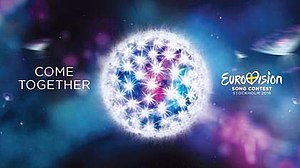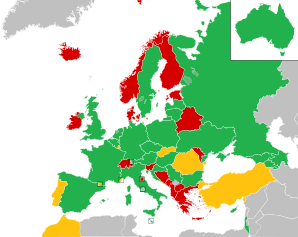http://www.eurovision.tv/tag/expand/2016
Eurovision Song Contest 2016
From Wikipedia, the free encyclopedia
"Eurovision 2016" redirects here. For the Junior Contest, see Junior Eurovision Song Contest 2016.
| Eurovision Song Contest 2016 Come Together | ||||
|---|---|---|---|---|
 | ||||
| Dates | ||||
| Semi-final 1 date | 10 May 2016 | |||
| Semi-final 2 date | 12 May 2016 | |||
| Final date | 14 May 2016 | |||
| Host | ||||
| Venue | Ericsson Globe, Stockholm,Sweden | |||
| Presenter(s) | ||||
| Director | Sven Stojanović | |||
| Executive supervisor | Jon Ola Sand | |||
| Executive producer |
| |||
| Host broadcaster | Sveriges Television (SVT) | |||
| Opening act |
| |||
| Interval act |
| |||
| Participants | ||||
| Number of entries | 42 | |||
| Debuting countries | None | |||
| Returning countries | ||||
| Withdrawing countries | ||||
| Vote | ||||
| Voting system | Each country awards two sets of 12, 10, 8–1 points to their 10 favourite songs: one from their professional jury and the other from televoting. | |||
| Nul points | None | |||
| Winning song | ||||
| Eurovision Song Contest | ||||
| ||||
The Eurovision Song Contest 2016 was the 61st edition of the Eurovision Song Contest. It took place in the Ericsson Globein Stockholm, Sweden, following Sweden's victory at the 2015 contest in Vienna with the song "Heroes", performed by Måns Zelmerlöw. This was the third time the contest had taken place in Stockholm, after 1975 and 2000, the latter also being held at the Globe. The contest consisted of two semi-finals on 10 and 12 May and the final on 14 May 2016. The three live shows were hosted by Zelmerlöw and Petra Mede. The winner of the contest was Ukraine, which won with Jamala's "1944", the second time it had won since 2004 with Ruslana's "Wild Dances". This was the first time since the re-introduction of the jury votes in 2009 that the eventual winner won neither the jury vote (won by Australia) nor the televote (won by Russia), placing only second on both. It was the first time a song with Crimean Tatar lyrics won the contest.
Forty-two countries participated in the contest. Bosnia and Herzegovina, Bulgaria, Croatia and Ukraine returned after absences from recent contests, while Australia also returned after debuting as a special guest in 2015. Portugal withdrew, largely due to their national broadcaster's insufficient promotion of their music-based media, while Romania had originally planned to participate, but was forced to withdraw due to repeated non-payment of debts by their national broadcaster to theEuropean Broadcasting Union (EBU). The contest was also the first to implement a new system for announcing the vote since1975: each country's professional jury points were announced as before, but televoting votes from all countries were pooled and announced in reverse order.
Twenty-six countries competed in the final, which was the first to be broadcast to the US. After five attempts since their debut in 2007, the Czech Republic managed to qualify for the final for the first time. Bosnia and Herzegovina and Greece both failed to progress out of the semi-finals for the first time ever, the latter being absent from the final for the first time since 2000. In the final Australia received its highest placing since starting its participation in 2015, and Bulgaria since starting its participation in 2005. American pop singer Justin Timberlake performed during the interval act.


Немає коментарів:
Дописати коментар